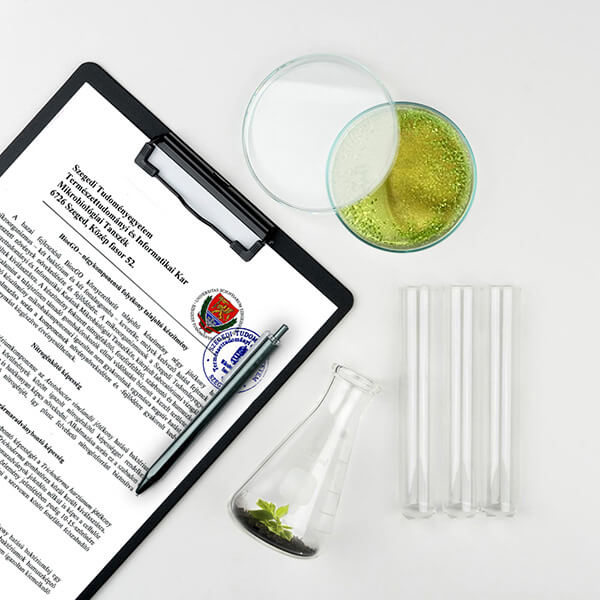
Who are we?
Our company was founded in 2003. Our area of work is microbiological research and development.
Our main product is named Bioego and it is a microbiological increaser of crop yield. It was developed with the internationally acclaimed scientists of the University of Szeged’s Department of Microbiology and the production is aided by a scientific institute, Bay Bio Institute.
We are the sole owners of the intellectual property to the product, which comprises of the unique formula, the production and sales technique.
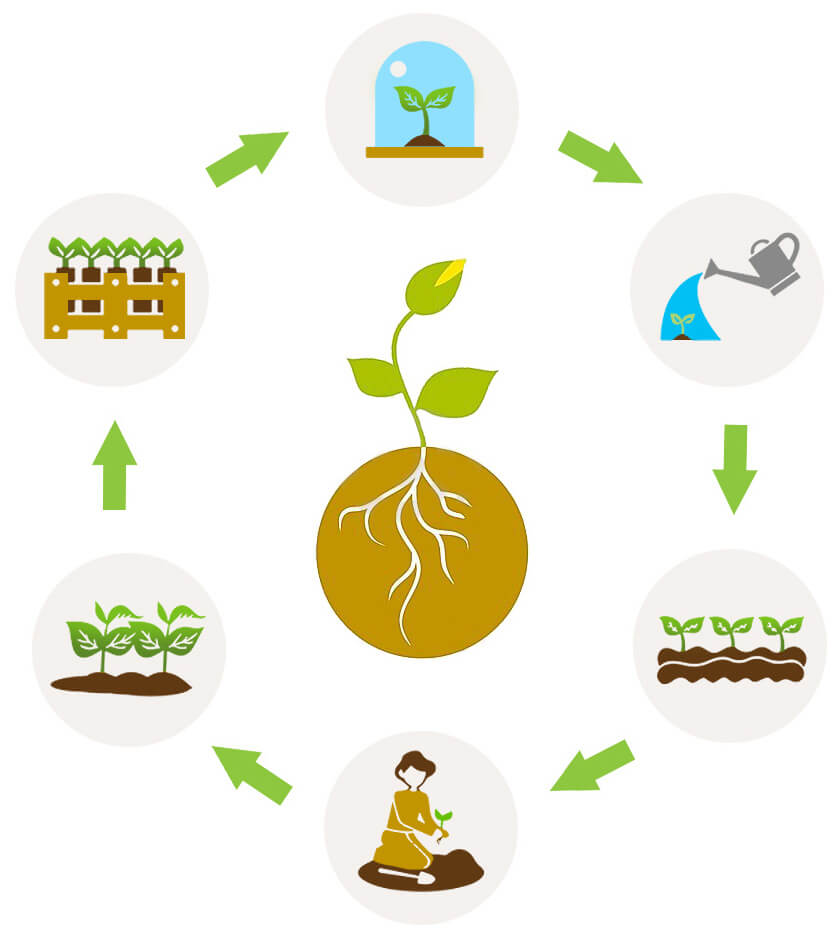
What is the BioeGO?
Bioego is a 4-component liquid soil biofertilizer
Bioego is an environment-friendly soil inoculant developed in Hungary. It is designed for agricultural use, the product is a liquid, new generation, 100 % organic, crop yield increasing, soil conditioning, stem degradation increaser and plant protector.
The product is tailored to the needs of the client because of its unique recipe and production technology. In case of a promising economic environment we could build production facilities in the area.
BioeGO is singular in that from research and development to production it is solely the work of microbiologists with academic degrees.
The uniqueness lies in that the four components of our product new generationally cover the life cycle of the soil, the conservation of nutrients, stem degradation, humus production, and biological protection.
Thanks to its singular production technique you can change the proportion of the components in conjunction with the soil.
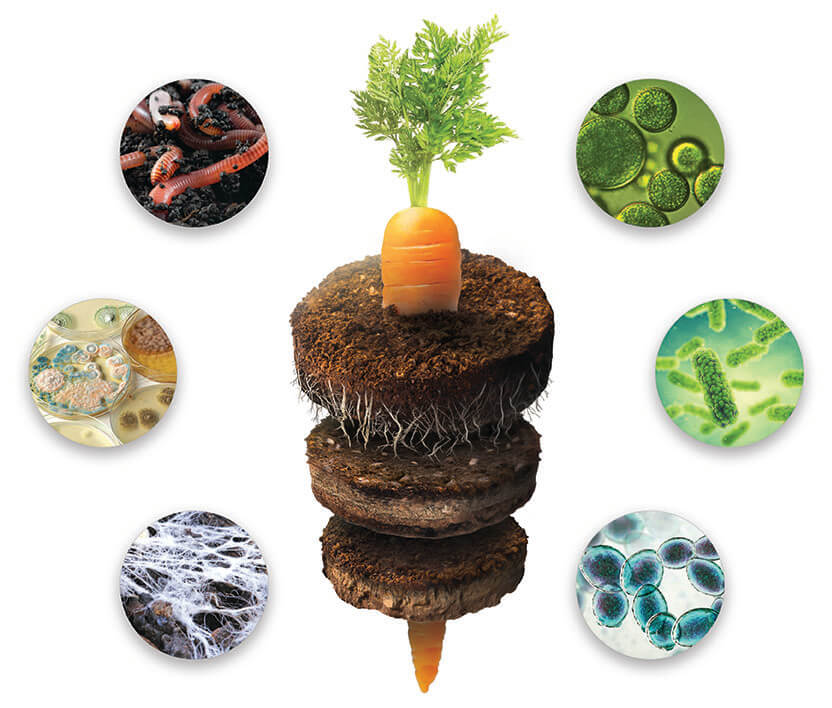
What is the BioeGO?
BioegGO is a 4-component liquid soil biofertilizer
BioeGO is an environment-friendly soil inoculant developed in Hungary. It is designed for agricultural use, the product is a liquid, new generation, 100 % organic, crop yield increasing, soil conditioning, stem degradation increaser and plant protector.
The product is tailored to the needs of the client because of its unique recipe and production technology. In case of a promising economic environment we could build production facilities in the area.

BioeGO is singular in that from research and development to production it is solely the work of microbiologists with academic degrees.
The uniqueness lies in that the four components of our product new generationally cover the life cycle of the soil, the conservation of nutrients, stem degradation, humus production, and biological protection.
Thanks to its singular production technique you can change the proportion of the components in conjunction with the soil.

The product is consisting of the mixture of four beneficial microorganisms – two bacteria and two fungi – which have favorable effects on the growth and development of crop plants. The microorganisms were selected at the Department of Microbiology, Faculty of Science and Informatics, University of Szeged after wide scale laboratory examinations. The product ensures increased nitrogen fixation, phosphorous mobilization, stem degradation and humus production on the treated field, furthermore it provides protective effects against soil-borne plant pathogenic fungi. It has been proven that the microbial components of the BioeGO soil inoculant do not have negative effects on each other, thereby all the beneficial effects of the components on plant growth and development can occur simultaneously, complementing each other.

Nitrogen-fixing ability
One of the bacterial components of the product is a strain of the beneficial species Azotobacter vinelandii, which has nitrogen-fixing abilities proven under laboratory conditions: it is capable of efficient growth even in a culture medium lacking nitrogen. During its application, this free living bacterium is able to fix nitrogen from the air, thereby providing excess nitrogen source for the crop plants in an available form.
Abilities of phosphorous mobilization and stem degradation
The phosphorous mobilization and stem degradation abilities of the product are ensured by a strain of the beneficial fungus Trichoderma harzianum, which has been selected out of 45 Trichoderma strains. This fungus is capable of producing cellulose-degrading enzymes even in the absence of stem residues, while this ability is increased 10-15 fold in the presence of grinded maize stem. The fungus is also producing large amounts of enzymes capable of liberating organically bound phosphorous.
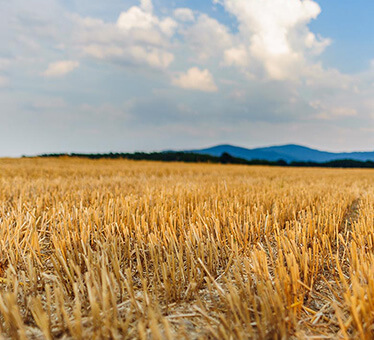

Ability of humus production
The humus-producing component of the product is a strain of the beneficial bacterium Streptomyces albus, which was selected out of 46 strains of bacteria. The humus-producing abilities of Streptomyces bacteria can be primarily attributed to the production of peroxidase enzymes. The selected bacterium has been proven to possess excellent peroxidase-producing abilities.
Protective effect against plant pathogenic fungi
The protective effects against plant pathogenic fungi is ensured by another fungal component of the product, a strain of the beneficial fungus Trichoderma asperellum selected out of 45 Trichoderma strains. Laboratory examinations proved that this fungus has outstanding abilities in competing and destroying several soil-borne fungal plant pathogens (e.g. Fusarium solani, Fusarium oxysporum, Phoma cucurbitacearum, Alternaria alternata, Botrytis cinerea, Rhizoctonia solani), thereby providing protective effects for the developing crop plants.
Trichoderma asperellum (on the left sides) in vitro antagonism against phytopathogenic fungal strains (on the right sides).
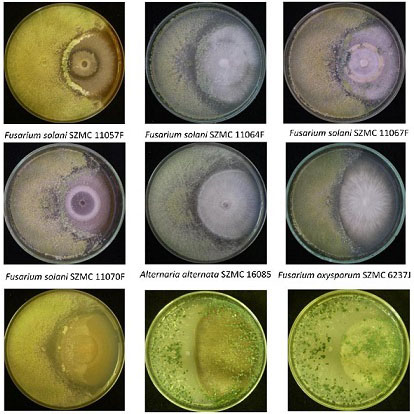
Nitrogen-fixing ability
One of the bacterial components of the product is a strain of the beneficial species Azotobacter vinelandii, which has nitrogen-fixing abilities proven under laboratory conditions: it is capable of efficient growth even in a culture medium lacking nitrogen. During its application, this free living bacterium is able to fix nitrogen from the air, thereby providing excess nitrogen source for the crop plants in an available form.

Abilities of phosphorous mobilization and stem degradation
The phosphorous mobilization and stem degradation abilities of the product are ensured by a strain of the beneficial fungus Trichoderma harzianum, which has been selected out of 45 Trichoderma strains. This fungus is capable of producing cellulose-degrading enzymes even in the absence of stem residues, while this ability is increased 10-15 fold in the presence of grinded maize stem. The fungus is also producing large amounts of enzymes capable of liberating organically bound phosphorous.

Ability of humus production
The humus-producing component of the product is a strain of the beneficial bacterium Streptomyces albus, which was selected out of 46 strains of bacteria. The humus-producing abilities of Streptomyces bacteria can be primarily attributed to the production of peroxidase enzymes. The selected bacterium has been proven to possess excellent peroxidase-producing abilities.

Protective effect against plant pathogenic fungi
The protective effects against plant pathogenic fungi is ensured by another fungal component of the product, a strain of the beneficial fungus Trichoderma asperellum selected out of 45 Trichoderma strains. Laboratory examinations proved that this fungus has outstanding abilities in competing and destroying several soil-borne fungal plant pathogens (e.g. Fusarium solani, Fusarium oxysporum, Phoma cucurbitacearum, Alternaria alternata, Botrytis cinerea, Rhizoctonia solani), thereby providing protective effects for the developing crop plants.
Trichoderma asperellum (on the left sides) in vitro antagonism against phytopathogenic fungal strains (on the right sides).

Application areas
agricultural production companies
bio-economies
national parks
grassland managements and compost plants interested in horticultural and plough-land plant culture
Main references

Innovation Award of the
Southern Great Plain Region
Contact
BioeGO Ltd.
H-6725 Szeged, Tisza Lajos str 33/B.



